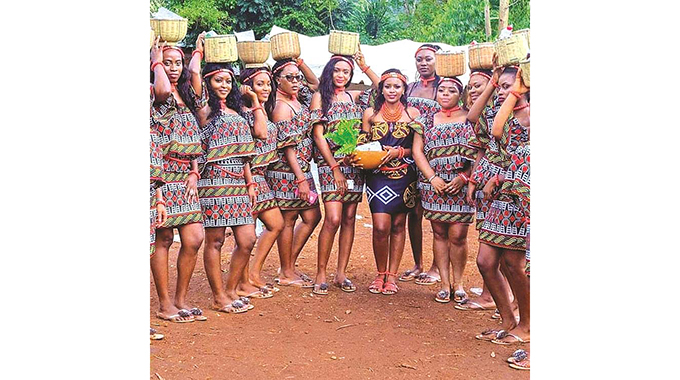Roora squads, changing the culture

Tafadzwa Zimoyo
Senior Lifestyle Writer
Receiving bride price (lobola or roora) is every parent or guardian’s wish when they marry off their daughters.
The rite is usually marked by merry-making, bingeing and even prayer, as the new couple will be expected to open a new and enthralling chapter. Over the years, the rite used to be sacred and enjoyable since it was a milestone when blessed by the elders.
Families would gather and even deliberate on the issue before the in-laws come for negotiations. But the rite is slowly being modernised and commercialised, after some locals borrowed from what happens in other countries.
“Roora Squads” are trending in Zimbabwe, giving a new aspect to this traditional ceremony by investing so much on the day.
Fashion designers are now making a killing, dressing costumes worn by the “squads” made up mostly of friends that attend the ceremony.
Those who are into baking also make good bucks, as some of the lobola rites now end up with couples exchanging rings and other goodies, a new phenomenon.
But the advent of ‘roora squads’ has brought both pain and relief.
While they seem to be supporting one of their own who will be getting married, cases of spoilers among the hordes of friends have been recorded.
Just a couple of weeks ago, one of the ‘besties’ spoiled the lobola party after revealing that the couple’s first child was from another man.

Social commentators, marriage counsellors and family builders now have divided opinion over the “roora squads”.
Some of the commentators interviewed said there was nothing wrong with such rites being commercialised, as long as in-laws were in agreement with the proceedings.
Others felt the rite was losing appeal as couples were now diverting from their culture.
Modern couples seem to be borrowing a lot form what happens in other countries, resulting in the lobola ceremony becoming more like a fashion show and a show-off of flamboyance.
This is threatening to steal all the pride and honour which used to be associated with such lobola ceremonies.
It now means that besides paying the bride price, one has to invest a lot in the wardrobe, champagne and refreshments.
The Herald on Saturday Lifestyle spoke to some of influencers who shared their divergent views with the majority in disagreement with the commercialisation of such an event.
Renowned talk-show host and marriage counsellor Rebecca Chisamba, affectionately known as Mai Chisamba, said some locals were diverting and straying from the local culture.

Mai Chisamba
She said there was nothing called roora squad in the local culture, as marriage is a private issue between the two parties.
“I have heard about the story which was trending on social media,” she said. “I think some Zimbabweans have a problem of just jumping on board on some of the trends which do not speak of our culture. There is nothing in our culture called roora squad.
“It is a private family function, because in some instances the families will have a disagreement on certain matters and it remains private on that day. Why would you need 10 friends to witness that?”
Mai Chisamba said lobola negotiations used to be descent affairs.
“This is when the groom or bride is asked if they are sure of the decision they are about to make, and it is not for the public and friends,” she said. “I think those who are doing the roora squad, are about showing off their fashion statements and moreover they are celebrating it the wrong way.
“Gone are the days when only family representatives would attend the ceremony.”
Mai Chisamba blamed the advent of technology that has decayed some of the local cultural values.
“I call them the dot.com generation,” she said. “They are the ones who are bringing more harm to our culture trying to imitate what they see on television.
“The son-in-law, when he goes to pay the lobola, he goes with a limited budget of food for the small number of people attending the event, but now imagine having 20 friends from both sides attending. Is it still the same system or we are talking about something else.
“What if the family you are going to has one room, how many chairs do they have? Never take things for granted.”
Mai Chisamba said it was a sorry and sad state that some people were defiling the lobola ceremony.
Relationship counsellor and United Methodist Church evangelist Bernard Banda said he has attended some of the lobola ceremonies with roora squads around, and found no problems with the events.

Evangelist Banda
“I do not have a problem with what is going on nowadays during the lobola ceremony because culture is dynamic and things are changing,” he said. “We should appreciate and accept the new norm.
“Having that squad is no big deal, even when I got married, I went with my friends. Now it is like a wedding, a big day, there is camera crew, catering and decoration. It is actually expensive though because we now have a theme to suit the day, including dressing.”
Banda said the only problem comes when some want to live beyond their means by hosting a big event.
“Somehow, it gives pressure even to the man who is coming to pay the lobola, trying to pay for some of the things like catering, decoration,” he said. “It is expensive and I have noticed most of the people seem not to be affording the new lifestyle. Think of the huge budget. I think the idea came from West Africa.”
Banda agreed that the lobola ceremony was only for the families, there is no need to take it to social media.
“Why then do you need to take it to social media?” he said. “Are you doing it for television, unless you are a socialite? Imagine then you end up having different views which affects you.”
A teacher with a local college, Timothy Mureka (53), said a roora squad was not necessary, unless the huge number of people had a part to play during the ceremony.
“What I know is that the friends that you go with at the ceremony will have a role to play,” he said. “During our time, I took my best friend and he was the go-between (munyayi). There were no cameras, no fashion statements, obvious a normal decent suit, not what we are seeing this today.
“Look what happened in that DNA story circulating on social media, who knew about it? If she had known, the friends could be living happily ever after.”











Comments